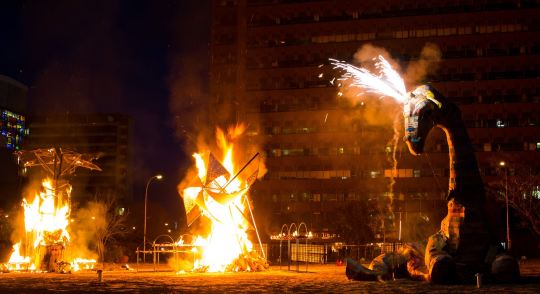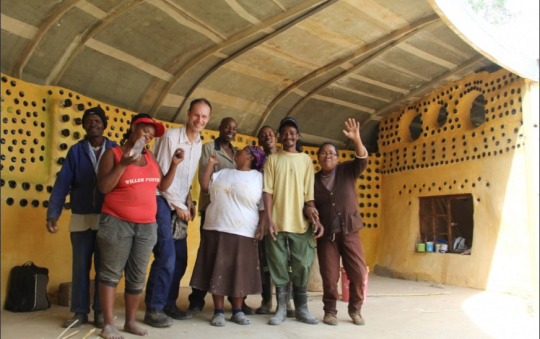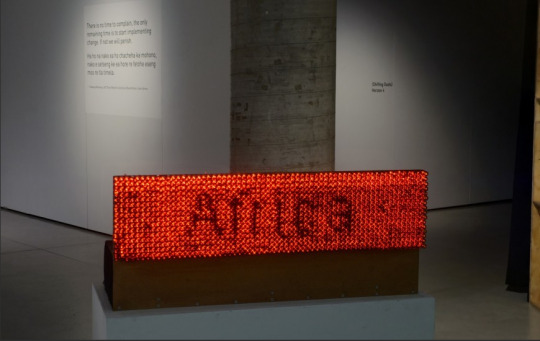#Qala Phelang Tala
Photo


VRYSTAAT ARTS FESTIVAL MEDIA RELEASE 22 MAY 2017
RE-FUTURE: ART AND THE ANTHROPOCENE
There is no time to complain, the only remaining time is to start implementing change. If not we will perish.
Thabang Mofokeng, HOT Rural Workers Collective
The Programme for Innovation in Artform Development (PIAD) is an initiative of the Vrystaat Arts Festival and the University of the Free State supported by The Andrew W. Mellon Foundation, which focuses on how technology, interdisciplinary and experimental art can connect with and impact on communities.
In 2017 the PIAD is proud to present the first outcome of the Re-Future project by internationally renowned media artist Dr Keith Armstrong in partnership with the Queensland University of Technology’s (QUT) Creative Industries, University of the Free State (UFS) Centre for Development Support and Anita Venter from Qala Phelang Tala (Start Living Green). Re-Future, seeks to embed contemporary artists within international development scenarios, in order to understand how their creative capacities can best contribute towards positive social and ecological development outcomes.
Professor Francis Petersen, Vice-Chancellor of the University of the Free State comments: ‘Climate scientists agree we have triggered a new era called the age of the Anthropocene where humans have become the main drivers behind planetary change. The negative impacts on communities worldwide, especially communities in developing countries such as South Africa, is significant - where these challenges are compounded by historical contexts of apartheid, unemployment, poverty and widespread welfare dependency. We are incredibly excited to partner with QUT and Dr Armstrong on Re-future, to explore how we can assist in the regeneration of our communities and the environment.’
Professor Mandy Thomas, Executive Dean, Creative Industries Faculty, QUT says: ‘We are honoured to be part of the contribution Dr Armstrong is making in South Africa with local partners and NGOs though Re-Future. In an era of climate change and environmental distress, he seeks to build networks of 're-futuring’ (giving time back to the future) throughout some of the poorest informal settlements in the Free State of South Africa.’
‘QUT is pleased to fully fund international PhD scholarships for practice-led arts workers including Christine Scoggin (US/AU), who was successful in a very competitive application round of global scholars. These researchers will work in Australia and South Africa on the Re-Future project over the next 3 years, to explore how creative thinkers and artists can assist in solving some of the very complex issues we face around sustainability and regeneration.’
Annalize Dedekind, Chair of the Vrystaat Arts Festival adds: ‘The Festival attaches great value to our partnerships with UFS and QUT. Learnings from this unique arts/development experiment will be disseminated to arts organisations and international development NGOs globally, initiating rich dialogues and sparking future transdisciplinary art initiatives.’
Seven Stage Futures, the inaugural project under the Re-Future banner, will be presented at the Vrystaat Arts Festival in July 2017. Seven Stage Futures enacts the development and production of a series of community-led Merakas (a form of 'gathering space’), to share knowledge, that draws upon the wisdom of both current and past generations. These events will be presented within ‘informal’ South African settlements in areas such as Caleb Motshabi, Roodenwaal and Botchabello, where audiences (currently entirely unserviced by cultural events, or indeed much at all) can actively participate in unique local celebrations that they have both proposed and co-created. Each event will be shaped by local 'change-agents' at sites where they have already built their own ‘shack replacement’ houses – using locally appropriate, no-cost materials – a new building-cum-artform we call ‘Post-Natural’ building.
Dr Armstrong will have two additional projects at the 2017 Vrystaat Arts Festival - The Mesh, an interactive, experiential solo exhibition at the Johannes Steggman Gallery (UFS), investigating how a ‘mesh’ of environmental, social and cultural ecologies form our worlds, asking how we might re-imagine our place and actions within those networks through the lens of ‘refuturing’; and Are we the one?, a site specific environmentally focussed work on the campus the UFS, which is a collaborative, performative and relational experience for two people, woven together by a custom digital phone app, where two walkers, who have never met, simultaneously use a phone to record a personalised walk around their locality, crafting a series of special moments and surprises for each other.
Artists such as Dr Armstrong have the capacity to foster new transdisciplinary collaborations, conducting their fieldwork across unexpected domains. In these cases they are not simply responding to a given proposition in a designated space, but rather entering the space of planning itself to help make change happen. This happens best when options run out and when planning alone isn’t enough. These projects respond to a desperate need for creativity and creative thinking – and success here could indeed be globally significant.
For further inquiries contact:
Roxanne Konco Marketing Manager Angela de Jesus PIAD Co-Director
Tel: +27 (0)51 404 7947 [email protected] Tel: +27 (0)51 401 2706 [email protected]
www.vrystaatartsfestival.co.za
The full 2017 Vrystaat Arts Festival Programme can be downloaded here: http://bit.ly/VSKunstefees2017
PARTNERS:
Programme for Innovation in Artform Development (PIAD), Vrystaat Kunstefees/Arts Festival/Tsa-Botjhaba, Johannes Stegmann Art Gallery, University Free State, Centre Development Support, Qala Phelang Tala, The Andrew W. Mellon Foundation, The Government of Flanders, Thabang Mofokeng, HOT Rural Workers Collective, Botshabelo, South Africa, QUT Creative Industries, Aerial Footage by Snappy Drone Photography, Arts House Melbourne, Embodied Media, City of Melbourne.
#university of the free state#Queensland University of Technology#programme for innovation in artform development#vrystaat kunstefees#vrystaat arts festival#vrystaat tsa-botjhaba#Qala Phelang Tala#andrew w mellon foundation
0 notes
Photo

SEVEN STAGE FUTURES MEET AND GREET - Join Mary Mofama, Velile Phantsi, Mokoena Maphalane, Ellen Maphalane, Dr Keith Armstrong and Anita Venter for a talk as part of the Programme for Innovation in Artform Development (PIAD), an initiative of the Vrystaat Arts Festival and the University of the Free State, supported by The Andrew W. Mellon Foundation.
'Seven Stage Futures’ enacts the development and production of a series of community-led ‘micro-festivals’, presented within ‘informal’ South African townships - where audiences (currently entirely unserviced by cultural events, or indeed much at all) can actively participate in unique local celebrations that they have both proposed and co-created. Each event will be shaped by local African 'change-agents' at sites where they have already built their own ‘shack replacement’ houses – using locally appropriate, no-cost materials – a new building-cum-artform we call ‘Post-Natural’ building.
#andrew w mellon foundation#vrystaat kunstefees#vrystaat arts festival#vrystaat tsa-botjhaba#Program for Innovation in Artform Development#university of the free state#Qala Phelang Tala
0 notes
Photo



Re-Future Rapid Response Australian Scholarship Opportunity!
Applications Due: 28 February 2017
The Queensland University of Technology (QUT) is calling for qualified candidates to apply for a targeted PHD paid Scholarship. The candidate will potentially work between Brisbane, Australia and Bloemfontein, South Africa on the project, Re-Future (http://embodiedmedia.com/homeartworks/re-future) developed by Dr Keith Armstrong (Associate Director of the QUT Creative Lab Research Centre). The Re-Future project coalesces with the aims of the Social and Ecological Practices Research Group at QUT which seek to understand, and demonstrate how transdisciplinary creative actions can best engage and affect the conditions of our contemporary world, with a specific focus upon people and species most affected by conditions of rapid change, conflict, racial tension, discrimination and environmental distress. Re-Future is a partnership between Dr Armstrong, the QUT Creative Lab Research Centre, the University of the Free State (South Africa), the Vrystaat Art Festival and Qala Pelang Tala (Start Living Green) social change initiative.
Is this for you?
Are you an artist-activist, a laterally thinking community development implementer, a transdisciplinary creative, a digital media artist focussed upon change-making practices, or some other kind of a passionate social, architecture, engineering or ecological change maker who would like to be paid to do a creatively driven PhD, working between South Africa and Australia?
Are you interested in applying your creative thinking (from any or several disciplines) and experimental practices to investigate new kinds of sustaining and regenerative futures?
How can social justice structures be influenced through creative ecological practices to enable marginalised individuals to influence their own livelihood future
Are you prepared to work in some of the least resourced communities in South Africa, in collaboration with leading NGOs, artists, academics, students and the township communities that this project serves?
Whilst we cover all doctoral fees and provide a reasonably living allowance for three years, (potentially extendable to 3.5). You will need to fund your own travel.
So who would you be working with?
The Creative Lab Research Centre, QUT Creative Industries, Brisbane Australia. https://www.qut.edu.au/creative-industries/about/news/news?news-id=111917
The Re-Future Project. http://embodiedmedia.com/homeartworks/re-future
The Qala Phelang Tala (Start Living Green), Bloemfontein, South Africa. https://www.facebook.com/Qala1Tala/
The University of the Free State. Centre for Development Support http://www.ufs.ac.za/cds
The Programme for Innovation in Artform Development (PIAD). https://www.facebook.com/PikoPiad-1435158293383474/?fref=ts
Vrystaat Kunstefees/Arts Festival/Tsa-Botjhaba. http://www.vrystaatkunstefees.co.za
Ok, but are you eligible?
Full applications due by 28 February 2017 – to be worked up with qualified supervisors, we will provide
Must meet English language requirements by the application closing date.
Must be able to start at latest by July 2017
Applicants can be currently situated anywhere globally but need to be able to travel to do extensive field work in Bloemfontein, South Africa, and also spend time in Brisbane, Australia at the state of the art new QUT Creative Lab Research Centre.
Full details here: https://www.qut.edu.au/study/fees-and-scholarships/scholarships-and-prizes/qut-postgraduate-research-award-qutpra
Need more context?
We are having a devastating effect on the planet. Climate change has moved from theoretical concept to pressing reality, with truly global affects. Climate scientists agree we have triggered a new era called the age of the Anthropocene where humans have become the main drivers behind planetary changes. The negative impacts on communities worldwide, and especially communities in developing countries such as South Africa are significant. In South Africa, climate challenges are compounded by historical contexts of apartheid, unemployment, poverty, crime, disability and widespread dependency on government interventions in marginalised communities. Many marginalised communities are still deprived of access to water, electricity, housing, education and basic health care. This begs the question, what innovative solutions can bridge the realities of climate change while maintaining the concept of human rights embedded in South Africa’s progressive constitution. A combination of transdisciplinary approaches will be needed to solve some of these problems that the country faces, which may require stepping outside the existing comfort zones and testing unconventional creative possibilities for making a difference at the grassroots levels. Crucially we need innovative solutions that envision a world beyond sustainability, focussing on regenerative livelihoods that are resilient to climate change. A regenerative approach describes processes that renew, restore, and revitalize communities. Regenerative systems aim to create positive, united living heritages for our future generations and ourselves.
What is Re-Futuring?
Most simply, Re-futuring is the act of ‘giving time back to the future’. If we think of time left (for ours and other species now and into the future) as being a medium we can manipulate, then any concerted actions that help increase that time left are considered potential acts of re-futuring - as opposed to those that reduce possibilities for those who come after us – i.e. acts of De-Futuring.
What will you therefore be contributing towards?
The aim of this experimental research program is to understand how transdisciplinary creative action that tests new paradigms, ideas & options might assist in inventing viable ‘break-through’ methods that aid regenerative capacity – both in South Africa and more generally globally.
And who would you be working with?
Keith Armstrong: Associate Director of the QUT Creative Lab Research Centre and member of the Social and Ecological Practices Group, media artist, researcher and director of Embodiedmedia Dr. Keith Armstrong from Brisbane Australia. www.embodiedmedia.com
Anita Venter who leads the Qala Phelang Tala (Start Living Green!) social change initiative supported by her role as a researcher at the University of the Free State, Centre for Development Support. http://www.ufs.ac.za/econ/departments-and-divisions/centre-for-development-support-home/general/staff?pid=j13AcR333js%3d
The Program For Innovation in Artform Development (PIAD) led by Senior Curator of the Johannes Stegman Art Gallery, Angela De Jesus and Director of the Vrystaat Kunstefees/Arts Festival/Tsa-Botjhaba, Dr. Ricardo Peach.
Are you the right artist-researcher for this significant challenge?
If so contact Dr. Keith Armstrong immediately – with overview of your background and thoughts, interests and enthusiasms at [email protected]
#vrystaat kunstefees#vrystaat arts festival#vrystaat tsa-botjhaba#Queensland University of Technology#university of the free state#Program for Innovation in Artform Development#south africa#australia#Qala Phelang Tala#andrew w mellon foundation
0 notes
Photo



Vrystaat Arts Festival Media Release 15 May 2017
The AlloSphere: Virtual Reality through Art and Science
The Programme for Innovation in Artform Development (PIAD) is an initiative of the Vrystaat Arts Festival and the University of the Free State (UFS), supported by The Andrew W. Mellon Foundation, which focuses on how technology, interdisciplinary and experimental art can connect with and impact on communities.
PIAD fosters innovation in artform development through a series of First Nations projects, critical debates and PIAD forums, arts or science and interdisciplinary residencies, OPENLab artist laboratories, as well as the production and presentation of challenging new work.
In 2017, PIAD is proud to present as forum keynote speaker Prof. JoAnn Kuchera-Morin, Director of the AlloSphere Research Group at the California NanoSystems Institute at the University of California, Santa Barbara. The PIAD forum, titled Complex Intersections: Transdisciplinary Engagements Across the Arts and Sciences, will take place during the 2017 Vrystaat Arts Festival on Thursday 20 July from 10:00 to 13:00 at the Naval Hill Planetarium in Bloemfontein. This will be Prof. Kuchera-Morin’s only speaking engagement in South Africa.
Prof. Francis Petersen, Vice-chancellor of the University of the Free State, says Prof. Kuchera-Morin is one of the most acclaimed thinkers on arts and science internationally. “As the inventor of the AlloSphere, she single-handedly developed a one-of-a-kind immersive instrument that is the culmination of 30 years of research. At the University of the Free State, through PIAD, we are looking at how we ourselves can develop international art and science facilities for Africa. We are very much looking forward to learning from Prof. Kuchera-Morin how she achieved her life’s work.”
The AlloSphere consists of a three-story cube with extensive sound absorption material, making it one of the largest near-to-anechoic chambers in the world. It is differentiated from conventional virtual reality environments by its seamless surround-view capabilities, ability to accommodate 30 or more people simultaneously in a shared virtual world, and its focus on multiple sensory modalities and interaction.
Annalize Dedekind, Chair of the Vrystaat Arts Festival, says: “Prof. Kuchera-Morin’s presentation will focus on how pushing hard science with advanced art can assist us in understanding the large amounts of data generated by research through what she terms ‘spatiotemporal data creation and ensemble-style data mining’. In layperson’s terms - how we can visualise a large amount of information so that we can better comprehend it.”
Prof. Kuchera-Morin’s keynote will be followed by a panel discussion with national and international cultural thinkers, including Rosemary Mangope (CEO, National Arts Council of South Africa), Dr Keith Armstrong (associate director, Creative Lab, Queensland University of Technology) and Dr Ella Ziegler (initiator of Salon Universitas: Art and Science Conversations, University of Kassel). DeBeer Cloete of the University of Groningen and the UFS will facilitate proceedings.
Other projects that are part of PIAD include international work such as: Giidanyba (Sky Beings) by Gumbaynggirr artist Tyrone Sheather, consisting of seven figure-like sculptures depicting nocturnal spirits that impart knowledge and guidance to the First Nation Gumbaynggirr people of Australia; Onesie World by Adele Varcoe, which sees 1 000 onesies designed and made by fashion students and manufacturers in Bloemfontein given away to festivalgoers; and Dr Keith Armstrong’s Seven Stage Futures, a series of events created by local “change agents” who are part of Qala Phelang Tala (Start Living Green), set in informal settlements in and around Bloemfontein and Mangaung designed as community-led “Meraka”, or gathering spaces.
Work by South African artists, all participants in the biannual OPENLab interdisciplinary laboratory of the PIAD, include: In These Streets by Wezile Mgibe, a live art and dance performance which speaks about his personal journey of self-discovery; PIE: Planning Impossible Errors by Ella Ziegler, Karin Tan, Skye Quadling and friends around the phenomenon of unexpected errors; and 29°06ʹS 26°13ʹE by Lhola Amira and Vasiki Creative Citizens, a performance work that explores significant past and present narratives in South Africa, including The Cattle Killing of 1857, Ukuzika kuka Mendi of 1917 and the Shimla Park Brawl at the UFS in 2016.
For further inquiries contact:
Roxanne Konco Marketing Manager
Angela de Jesus PIAD Co-Director
Tel: +27 (0)51 404 7947 [email protected] Tel: +27 (0)51 401 2706 [email protected]
www.vrystaatartsfestival.co.za
Images: Director JoAnn Kuchera-Morin immersed in earth data on the AlloSphere Bridge. Photo courtesy of UCSB. The AlloSphere immersive instrument created by Prof. JoAnn Kuchera-Morin, courtesy of the University of California, Santa Barbara (UCSB). Director JoAnn Kuchera-Morin immersed in anatomically correct human body data from a magnetic resonance imaging device (MRI). Photo courtesy of UCSB.
#vrystaat kunstefees#vrystaat tsa-botjhaba#vrystaat arts festival#university of the free state#situate art in festivals#Salamanca Arts Centre#allosphere#university of california#programme for innovation in artform development
0 notes